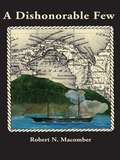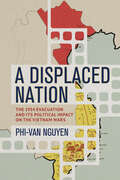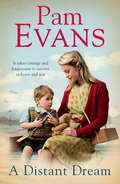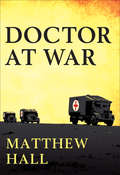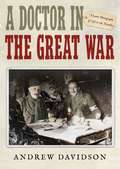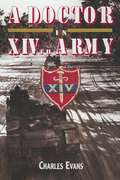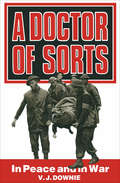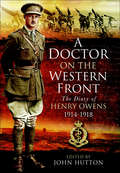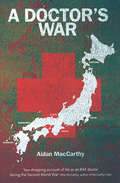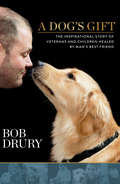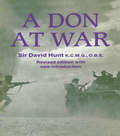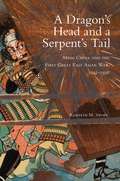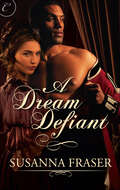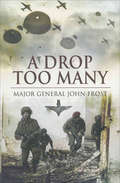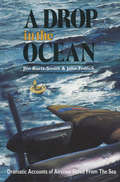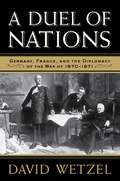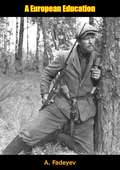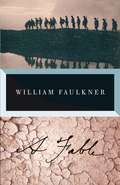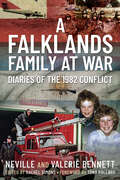- Table View
- List View
A Dishonorable Few (Honor Series)
by Robert N. MacomberRobert Macomber's Honor series of naval fiction follows the life and career of Peter Wake in the U.S. Navy during the tumultuous years from 1863 to 1901. Dishonorable Few is the fourth in the series.It is 1869. The United States is painfully recovering from the Civil War, and Lt. Peter Wake concludes the first shore duty of his career at Pensacola Naval Yard to become the executive officer of the USS Canton. Headed to turbulent Central America to deal with a former American naval officer turned renegade mercenary, Wake discovers that no one trusts anyone in that deadly part of the world—with good reason.As the action unfolds in Colombia and Panama, Wake realizes that his most dangerous adversary may be a man on his own ship, forcing him to make a decision that will lead to his court-martial in Washington when the mission has finally ended.This historical thriller will take the reader from the sinister streets of Cartagena to the reef-strewn coast of Nicaragua to the halls of power in Washington, D.C. Along the way, the ambitions of European empires, Latin American dictatorships, and American politics form a dark background to Wake's desperate search for a maniacal killer—and his own trial.
A Displaced Nation: The 1954 Evacuation and Its Political Impact on the Vietnam Wars (Studies of the Weatherhead East Asian Institute, Columbia University)
by Phi-Van NguyenIn A Displaced Nation, Phi-Van Nguyen argues that the displacement of eighty thousand mostly Roman Catholic evacuees from North Vietnam in 1954 had a profound impact on the war opposing Saigon on both Hanoi and on the evacuees themselves. Assisting with the transportation, emergency relief, and resettlement of the evacuees allowed diverse organizations and the United States to support Saigon. This transnational mobilization also convinced the evacuees the "free world" would never let Vietnam remain divided.Many people see the Vietnam wars spanning from 1945 to 1989 as separate conflicts. But Nguyen demonstrates that the evacuees experienced a continuous civil war. A Displaced Nation shows the evacuees felt so validated by transnational support that they thought they could use this external help to return one day to the north. This belief was not constant nor were the strategies to achieve it the same for all, but through their political activism and action the evacuees showed they were willing to seize any opportunity to oppose Hanoi during the subsequent decades, even once established overseas.
A Distant Dream: It takes courage and forgiveness to survive sickness and war
by Pamela EvansA loving family. A deadly illness. A country on the brink of war. Pam Evans, much-loved author of In the Dark Streets Shining, brings us an enthralling and heart-wrenching saga about the enduring power of love, courage and friendship during the dark days of war. Perfect for fans of Dilly Court and Cathy Sharp. 'A superb and heartwarming read' - Irish IndependentIt's 1936 in West London, and fifteen-year-old May Stubbs and her family have endured the worst of The Depression. Looking forward to a more prosperous future, they take on a derelict cricket pavilion, convert it into a café and general store, and find it quickly becomes the hub of the community. Then May contracts tuberculosis, and the way ahead looks less certain. Leaving her best friend, Betty Lane, and lifelong soul mate, George Bailey, behind, she is sent away to fight off the illness. But on her return to London, she finds things have changed. And when war is declared, it is clear that serious complications and heartache lie in store for them all. What readers are saying about A Distant Dream: 'Where would the book world be without Pamela Evans books to brighten our day! I can't praise this book enough and am eagerly awaiting the next one from this author' 'Not just a wonderful story, but wonderful characters... you feel as though you have made new friends. I always thoroughly enjoy Pamela Evans books and think this one has to be one of her best'
A Distant Prayer
by Joseph Banks Jerry BorrowmanJoseph Banks served in a B-17 bomber during WWII. This is a first-hand narrative of his experiences in the military and as a prisoner of war: his sufferings, his triumphs, his joys.
A Doctor at War
by Matthew HallDoctor at War charts the fascinating account of one man's wartime experiences. Born in Geneva in 1909, Colonel Martin Herford served in the Spanish Civil War, then, on the outbreak of World War II, he saw service in Finland and across Europe as the Allies drove the Germans back to their homeland. Herford was even present at the liberation of Belsen, the notorious concentration camp.A testament to Churchill's famous maxim 'when you're going through hell, keep going', Herford is an inspiration, and this book is a moving account of his heroism, utilising contemporary diaries, letters, notes and official dispatches.Even though the doctors, nurses and stretcher-bearers of the military are every bit as courageous as the front line soldiers, they are very seldom written about. The image of a team of medics tucked away behind the front lines is far from accurate as very often the wounded were treated in the midst of battle with bullets flying and shells exploding all around.
A Doctor in The Great War
by Andrew DavidsonFeaturing 250 previously unknown photographs, this is the extraordinary true story of a young doctor whose photos left behind an astonishing firsthand account of life at the front of World War I.As a twenty-five-year-old medical officer and one of the first doctors to win the Military Cross, Fred Davidson took countless photographs while he served in the trenches from 1914-1915. Though he took them illegally, more than 250 of the photographs shot by Davidson and his fellow officers survived and are now shared for the first time in this harrowing, eye-catching, and poignant narrative of the Great War. In A Doctor in the Great War, author Andrew Davidson--the grandson of Fred--depicts the everyday lives of soldiers, both on and off duty: from the parade ground at Glasgow's Maryhill to the brothels of Armentieres, from the band of brothers who dubbed themselves "Old Contemptibles" to the original folding Kodak and Ansco cameras they used. It is the story of the 1st Cameronians, who achieved notoriety for selling the Great War's earliest front line photographs. And it is a deeply personal account of the pictures that have been passed down for three generations, describing the men who fought with Fred Davidson, the conditions they served in, the battles they saw, and the horrors they endured. A must-have for history and photography enthusiasts alike, this glimpse of the War to End All Wars is an unusually intimate portrait that will engulf you in the lives of soldiers and leave you humbled and amazed.
A Doctor in The Great War
by Andrew DavidsonFeaturing 250 previously unknown photographs, this is the extraordinary true story of a young doctor whose photos left behind an astonishing firsthand account of life at the front of World War I.As a twenty-five-year-old medical officer and one of the first doctors to win the Military Cross, Fred Davidson took countless photographs while he served in the trenches from 1914-1915. Though he took them illegally, more than 250 of the photographs shot by Davidson and his fellow officers survived and are now shared for the first time in this harrowing, eye-catching, and poignant narrative of the Great War. In A Doctor in the Great War, author Andrew Davidson--the grandson of Fred--depicts the everyday lives of soldiers, both on and off duty: from the parade ground at Glasgow's Maryhill to the brothels of Armentieres, from the band of brothers who dubbed themselves "Old Contemptibles" to the original folding Kodak and Ansco cameras they used. It is the story of the 1st Cameronians, who achieved notoriety for selling the Great War's earliest front line photographs. And it is a deeply personal account of the pictures that have been passed down for three generations, describing the men who fought with Fred Davidson, the conditions they served in, the battles they saw, and the horrors they endured. A must-have for history and photography enthusiasts alike, this glimpse of the War to End All Wars is an unusually intimate portrait that will engulf you in the lives of soldiers and leave you humbled and amazed.
A Doctor in The Great War: Unseen Photographs of Life in the Trenches
by Andrew DavidsonFeaturing 250 previously unknown photographs, this is the extraordinary true story of a young doctor whose photos left behind an astonishing firsthand account of life at the front of World War I.As a twenty-five-year-old medical officer and one of the first doctors to win the Military Cross, Fred Davidson took countless photographs while he served in the trenches from 1914-1915. Though he took them illegally, more than 250 of the photographs shot by Davidson and his fellow officers survived and are now shared for the first time in this harrowing, eye-catching, and poignant narrative of the Great War. In A Doctor in the Great War, author Andrew Davidson--the grandson of Fred--depicts the everyday lives of soldiers, both on and off duty: from the parade ground at Glasgow's Maryhill to the brothels of Armentieres, from the band of brothers who dubbed themselves "Old Contemptibles" to the original folding Kodak and Ansco cameras they used. It is the story of the 1st Cameronians, who achieved notoriety for selling the Great War's earliest front line photographs. And it is a deeply personal account of the pictures that have been passed down for three generations, describing the men who fought with Fred Davidson, the conditions they served in, the battles they saw, and the horrors they endured. A must-have for history and photography enthusiasts alike, this glimpse of the War to End All Wars is an unusually intimate portrait that will engulf you in the lives of soldiers and leave you humbled and amazed.
A Doctor in the XIVth Army
by Charles EvansCharles Evans records his passage from idyllic youth, fresh from Oxford in 1939, into the harsh reality of a junior doctor in Burma. Beautifully written and elegantly vivid, his diaries illuminate the progress of this ugly campaign while his post-war life saw ground-breaking work as a mountaineer, eventually rewarded by a knighthood.
A Doctor of Sorts: In Peace and in War
by V.J. DownieAnecdotal in style, these memoirs do not follow a chronological order. The author is a surgeon who, from the harrowing account of the crossing of the River Rapido in World War II to the story of a man with a poker up his backside, reveals himself to be a man of compassion and a skilful raconteur.
A Doctor on the Western Front: The Diary of Henry Owens, 1914-1918
by Henry OwensHenry Owens Great War diary provides a vivid and complete narrative, seen from the perspective of an army doctor, of what it was like to live and fight in the trenches of the Western Front. Owens, a member of the original British expeditionary Force, the Old Contemptibles, was among the first British soldiers to set foot in France. He spent the next four years in the front line as a doctor and a diarist, an eyewitness to some of the most bitter and violent struggles of the greatest conflict the world had ever seen. His writing, edited and with a full introduction by John Hutton, gives us an inside view of the duties and experiences of a doctor tending the fighting troops, and it paints a graphic portrait of the daily lives of the men themselves. Henry Owens was born into a doctors family in Long Stratton, Norfolk in 1889. When war was declared in 1914, he joined the Royal Army Medical Corps and was sent to France with the British Expeditionary Force. He served as a front-line medical officer throughout the conflict and he kept a diary and notes. After the war he used this material to assemble this meticulous account of his experiences. After being demobilized in 1919 he returned to civilian medical practice and married, but he died after a sudden illness in 1921, aged just 31. After the death of his wife in 1980, the diary came into the possession of the Imperial War Museum.
A Doctor's War
by Aidan MacCarthyAn &“engrossing&” memoir of a Royal Air Force doctor&’s World War II experiences, from surviving Dunkirk to witnessing Nagasaki (The Irish Times). As an RAF medical officer, Aidan MacCarthy served in France, survived Dunkirk, and was interned by the Japanese in Java, where his ingenuity helped his fellow prisoners through awful conditions. While en route to Japan in 1944, his ship was torpedoed, sending him into the Pacific. Miraculously, MacCarthy was rescued by a whaling boat—only to be re-interned in Japan. Ironically, it was the dropping of the atomic bomb at Nagasaki that saved his life, though it also meant being an eyewitness to the horror and devastation it caused. Long out of print, this remarkable war memoir was rediscovered during a journey through Ireland by Pete McCarthy, author of McCarthy&’s Bar, who describes it as &“jaw-dropping.&” &“Written in a straightforward, matter-of-fact tone, this book is marked by the author&’s ability to keep cool under adversity and by his admirable sense of humor and irony. A wonderful, if chilling work.&” —Publishers Weekly &“A gripping read.&” —Evening Echo
A Dog Like Daisy
by Kristin O'Donnell TubbMax meets A Dog Called Homeless in this sweet and poignant middle grade novel told from the humorous, thoughtful perspective of a rescued pit bull as she trains to be a service dog for an injured veteran and his family.Daisy has only ten weeks to prove her usefulness or else be sent back to the pound. Yet if she goes back, who will protect Colonel Victor from his PTSD attacks? Or save the littler human, Micah, from those infernal ear muzzles he calls earphones? What if no one ever adopts her again?Determined to become the elite protector the colonel needs, Daisy vows to ace the service dog test. She’ll accept the ridiculous leash and learn to sit, heel, shake, even do your business, Daisy when told to. But Daisy must first learn how to face her own fears from the past or risk losing the family she’s so desperate to guard—again.
A Dog Named Beautiful: A Marine, a Dog, and a Long Road Trip Home
by Rob KuglerAn uplifting and unforgettable story of a US Marine, his extraordinary dog, and the road trip of a lifetime.When US Marine Rob Kugler returns from war he had given up not only a year of his life in service to his country, but he had also lost a brother in the fighting as well. Lost in grief, Rob finds solace and relief in the one thing that never fails to put a smile on his face: his chocolate lab Bella. Exceptionally friendly, and always with - you wouldn’t believe it - a smile on her face, Bella is the friend Rob needs, and they spend their days exploring nature and taking photos. But then Bella develops a limp in her front leg. It’s cancer, and the prognosis isn’t good. Rob has a choice, either to let Bella go now, or amputate her cancer riddled leg, and see what the next few months would bring.For Rob, the choice is a no-brainer, and instead of waiting at home for the cancer to spread, Rob and Bella pack their bags and hit the road. Life is short, but the road ahead is long and winding, and as they criss-cross the country Rob and Bella meet remarkable, life-changing men and women who are quick to make friends with this incredible three-legged dog. A Dog Named Beautiful is a book full of inspiration, hope, love, tears, and laughs. Enjoy the journey.
A Dog's Gift: The Inspirational Story of Veterans and Children Healed by Man's Best Friend
by Bob DruryA decade ago, former military counterintelligence officer Terry Henry joined his precocious young daughter, Kyria, on a trip to a nursing home in order to allow its residents to play with their family dog, a golden retriever named riley. Terry was astounded by the transformations that unfolded before his eyes. Soon after, Terry and Kyria started their service dog organization, paws4people, with the goal of pairing dogs with human beings in need of healing, including traumatized and wounded war veterans and children living with physical, emotional, and intellectual disabilities.In A Dog's Gift, award-winning journalist and author Bob Drury movingly captures the story of a year in the life of paws4people and the broken bodies and souls the organization mends. The book follows the journey of pups bred by the organization from their loving, if rigorous, early training to an emotional event that terry and Kyria have christened "the bump," where each individual service dog chooses its new owner through an almost mystical connection that ignites the healing process. incorporating vivid storytelling, insights into canine wisdom, history, science, and moving tales of personal transformation, A Dog's Gift is a story of miracles bound to be embraced by not only the 60 million Americans who own dogs, but by anyone with a full heart and a loving soul.
A Don at War (Studies in Intelligence)
by Sir David, HuntWhen A Don at War was published in 1966 it was hailed as the first book to be written from the point of view of the Intelligence staff officer in the field with critics remarking on Sir David Hunt's authoritative exposition of British as well as German strategies. Eight years later it was revealed that the British, through the Ultra' system, were able to decode even the most important German radio messages despite the fact they were sent in the supposedly unbreakable Enigma cipher'. Since 1974 the great secret has become common knowledge. As a result Sir David has specially written for this second edition a new foreword whose main purpose is to explain the use made of Ultra during four years campaigning in the Mediterranean.
A Dragon's Head and a Serpent's Tail: Ming China and the First Great East Asian War, 1592-1598
by Kenneth M. SwopeThe invasion of Korea by Japanese troops in May of 1592 was no ordinary military expedition: it was one of the decisive events in Asian history and the most tragic for the Korean peninsula until the mid-twentieth century. Japanese overlord Toyotomi Hideyoshi envisioned conquering Korea, Ming China, and eventually all of Asia; but Korea's appeal to China's Emperor Wanli for assistance triggered a six-year war involving hundreds of thousands of soldiers and encompassing the whole region. For Japan, the war was "a dragon's head followed by a serpent's tail": an impressive beginning with no real ending. Kenneth M. Swope has undertaken the first full-length scholarly study in English of this important conflict. Drawing on Korean, Japanese, and especially Chinese sources, he corrects the Japan-centered perspective of previous accounts and depicts Wanli not as the self-indulgent ruler of received interpretations but rather one actively engaged in military affairs--and concerned especially with rescuing China's client state of Korea. He puts the Ming in a more vigorous light, detailing Chinese siege warfare, the development and deployment of innovative military technologies, and the naval battles that marked the climax of the war. He also explains the war's repercussions outside the military sphere--particularly the dynamics of intraregional diplomacy within the shadow of the Chinese tributary system. What Swope calls the First Great East Asian War marked both the emergence of Japan's desire to extend its sphere of influence to the Chinese mainland and a military revival of China's commitment to defending its interests in Northeast Asia. Swope's account offers new insight not only into the history of warfare in Asia but also into a conflict that reverberates in international relations to this day.
A Dream Defiant
by Susanna FraserSpain, 1813Elijah Cameron, the son of runaway slaves, has spent his whole life in the British army proving that a black man can be as good a soldier as a white man. After a victory over the French, Elijah promises one of his dying men that he will deliver a scavenged ruby necklace to his wife, Rose, a woman Elijah has admired for years.Elijah feels bound to protect her and knows a widow with a fortune in jewels will be a target. Rose dreams of using the necklace to return to England, but after a violent attack, she realizes that she needs Elijah's help to make the journey safely.Her appreciation for Elijah's strength and integrity soon turns into love, but he doubts she could want a life with him, knowing the challenges they'd face. As their relationship grows, she must convince Elijah that she wants him as more than a bodyguard. And she must prove that their love can overcome all obstacles, no matter the color of their skin.28,000 words
A Drop Too Many
by John FrostNo one who has read of Arnhem can have failed to have been inspired by gallantry of the 2nd Parachute Regiment, which held the north end of the key road bridge over the Rhine not for 24 hours for which it was equipped, but for 3 days and 4 nights. Commanded by the then Lt-Col Frost, they beat off repeated armoured and infantry assaults by far greater numbers, until forced out of the ruined and burning positions by losses, lack of ammunition, and the failure of the whole Arnhem operation. Their sacrifice stands as one of the most heroic defences of all time.General Frost's story is, in effect, that of the battalion. His tale starts with the Iraq Levies and goes on the major airborne operations in which he took part—Bruneval, Tunisia, Sicily, Italy, Arnhem—and continues with his experiences as a prisoner and the reconstruction of the battalion after the German surrender.Though written with modesty and humour, the book is shot through with the fire and determination of the fighting solider, and throws important new light on many controversies, not only those of Arnhem.
A Drop in the Ocean: Dramatic Accounts of Aircrew Saved From the Sea (Ulverscroft Large Print Ser.)
by John FrenchIn the summer of 1942 a Wellington bomber, operating with 115 Squadron from Marham in Norfolk was forced to ditch in the North Sea returning from a raid on Hamburg. Two members of the crew, who were picked up by the Luftwaffe, have written this book. '
A Duel of Nations
by David WetzelOn July 19, 1870, Emperor Napoleon III of France declared war against the Prussia of King William I and Prime Minister Otto von Bismarck. A Duel of Nationsdramatically depicts the world in which that war took place. In this, the first book in English to study in totality the diplomatic history of the Franco-Prussian War, David Wetzel draws extensively on private and official records, journalistic accounts, cabinet minutes, and public statements by key players to produce a book that is unmatched in the range and clarity of its analysis, its forceful characterizations, and its vivid language.
A European Education
by Romain GaryA NOVEL OF DESPERATE LOVE, BITTER HOPE, CHILLING COURAGE AND RELENTLESS BRAVERY“THIS quietly terrible parable for our times was first published in France fifteen years ago and was awarded the Prix de Critiques. It was translated into fourteen languages, but not into English. Since then M. Gary has won international fame with several other books. Now an entirely rewritten and, M. Gary hopes, a much improved version of A EUROPEAN EDUCATION is published in English for the first time.“A too hasty glance at A EUROPEAN EDUCATION might give the impression that no novel has ever borne a more sadly ironical title, because this is a story of innocence ‘educated’ in all the horrors and atrocities of modern war. But some of the graduates of the twentieth century’s school of despair learned something other than the subjects taught. They learned that man’s dream of freedom, of dignity and of love, is immortal; that his faith in a future without hatred cannot be destroyed.”—Orville Prescott in THE NEW YORK TIMES“A EUROPEAN EDUCATION is a story of unmitigated privation and terror. But it is also the story of the human heart’s triumph over evil even in the exercise of evil.“A EUROPEAN EDUCATION is about a group of partisans called the ‘green ones’ because they live in the forests of Poland. They hide in caves, steal food and sabotage every effort of the Germans.“Before the book ends, the hero has become a man; he has killed; he has learned how to steal without being caught, how to make friends with the Germans whom he intends to kill, and how to love.“The title is inherent in Janek’s bitter summing up of what he has learned; ‘...all this European education comes down to is to teach you how to find the courage to shoot a man who sits there with lowered head....’“This may not be Romain Gary’s most popular book, but it is a little masterpiece and may prove to be his.”—THE CHICAGO TRIBUNE
A Fable
by William FaulknerAn allegorical story of World War I, set in the trenches in France and dealing ostensibly with a mutiny in a French regiment, it was originally considered a sharp departure for Faulkner. Recently it has come to be recognized as one of his major works and an essential part of the Faulkner oeuvre. <P><P> This novel won both the Pulitzer Prize and the National Book Award in 1955.
A Falklands Family at War: Diaries of the 1982 Conflict
by Neville Bennett Valerie BennettMany military accounts of the British side of the Falklands War have been published as well as memoirs written by servicemen who took part, so this aspect of the story of the Argentine occupation and the British liberation of this remote territory in the South Atlantic is well known. But little attention has been paid to the Falkland islanders who had direct personal experience of this extraordinary crisis in their history. That is why the previously unpublished diaries of Neville Bennett and his wife Valerie, a fireman and a nurse who lived with their two daughters in Port Stanley throughout the war, is such vivid and revealing reading. As chief fireman Neville was frequently called out to deal with fires and other incidents during the occupation, and each day he recorded what happened and what he thought about it in his sharp and forthright way. Valerie saw a different side of the occupation through her work at the Stanley hospital where she had to handle the Argentines as well as daily accidents and emergencies. Their joint record of the exceptional circumstances in the Falklands in April, May and June 1982 gives us a fascinating inside view of family life during the occupation and of their relations with the Argentine soldiers and commanders. It is engrossing reading.
A Falklands Family at War: Diaries of the 1982 Conflict
by Neville Bennett Valerie BennettMany military accounts of the British side of the Falklands War have been published as well as memoirs written by servicemen who took part, so this aspect of the story of the Argentine occupation and the British liberation of this remote territory in the South Atlantic is well known. But little attention has been paid to the Falkland islanders who had direct personal experience of this extraordinary crisis in their history. That is why the previously unpublished diaries of Neville Bennett and his wife Valerie, a fireman and a nurse who lived with their two daughters in Port Stanley throughout the war, is such vivid and revealing reading. As chief fireman Neville was frequently called out to deal with fires and other incidents during the occupation, and each day he recorded what happened and what he thought about it in his sharp and forthright way. Valerie saw a different side of the occupation through her work at the Stanley hospital where she had to handle the Argentines as well as daily accidents and emergencies. Their joint record of the exceptional circumstances in the Falklands in April, May and June 1982 gives us a fascinating inside view of family life during the occupation and of their relations with the Argentine soldiers and commanders. It is engrossing reading.
